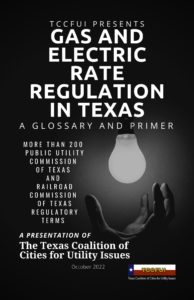A lawsuit filed by a Houston-based power trader alleges the PUC created “illegal competition rules” by implementing changes that drove up wholesale energy prices.
________________________________________________
Texas regulators broke the law by implementing rules changes that have led to billions of dollars in power price increases, according to a newly filed lawsuit.

Find definitions for ERCOT terms in TCCFUI’s regulatory glossary, under the “Resources” tab of the website.
The lawsuit, filed by Houston-based power trader Aspire Power Ventures, alleges that the Texas Public Utility Commission created “illegal competition rules” by implementing the changes. As such, the PUC failed to comply with state notice and comment requirements established under the Administrative Procedures Act. Aspire filed the suit on Feb. 13 in the 3rd Court of Appeals in Austin.
At the heart of the lawsuit is the controversial ERCOT Contingency Reserve Service (ECRS), which the PUC implemented in June 2023. Under the program, generation resources or qualifying large load with the capacity of delivering power for two hours with 10-minute notice can receive payments for holding out their power as reserves. However, Aspire claims the program has caused “market chaos” by dramatically driving up ERCOT prices. The state’s Independent Market Monitor for the ERCOT Market also has claimed that ECRS led to artificial shortages that drove up wholesale power costs by an estimated $12.5 billion last year.
Aspire attorney Chrysta Castañeda has said that the PUC kept the public “in the dark” as it implemented the rule, according to media reports. “Rather than give the public notice of the (program’s) rules before they were enacted and allow people to challenge them before they were finalized, the PUC issued rules that were obscured from public scrutiny and ended up costing Texans dearly,” Castañeda said.
The PUC has declined to comment to media outlets about the case.
Concerns about ECRS
The ECRS is among several regulatory initiatives implemented by the PUC and the Texas Railroad Commission in the wake of widespread power outages during Winter Storm Uri in 2021. Although some PUC and ERCOT officials dispute the conclusions, ERCOT’s independent monitor has stood by the analysis that the program has cost Texans billions of dollars.
“I don’t want to exaggerate how bad this is, but this is the worst performance we’ve ever seen since the beginning of organized electricity markets almost 25 years ago,” said David Patton, president of Virginia-based Potomac that serves as the monitor.
Patton told members of ERCOT’s Technical Advisory Committee in December that the increased costs for the wholesale market were like tacking on about $400 “for every man, woman and child in Texas.”
“I’ve never seen anything remotely this bad,” he said.
Aspire filed an unrelated pricing complaint at the PUC in 2020 that hinged on a transmission issue that also elevated prices. Ultimately, the PUC dismissed the complaint. The new case is Aspire Power Ventures LP v. Public Utility Commission of Texas, No. 03-24-00102-CV, 3rd Texas Court of Appeals (Austin).
More information about the ECRS can be found here.

